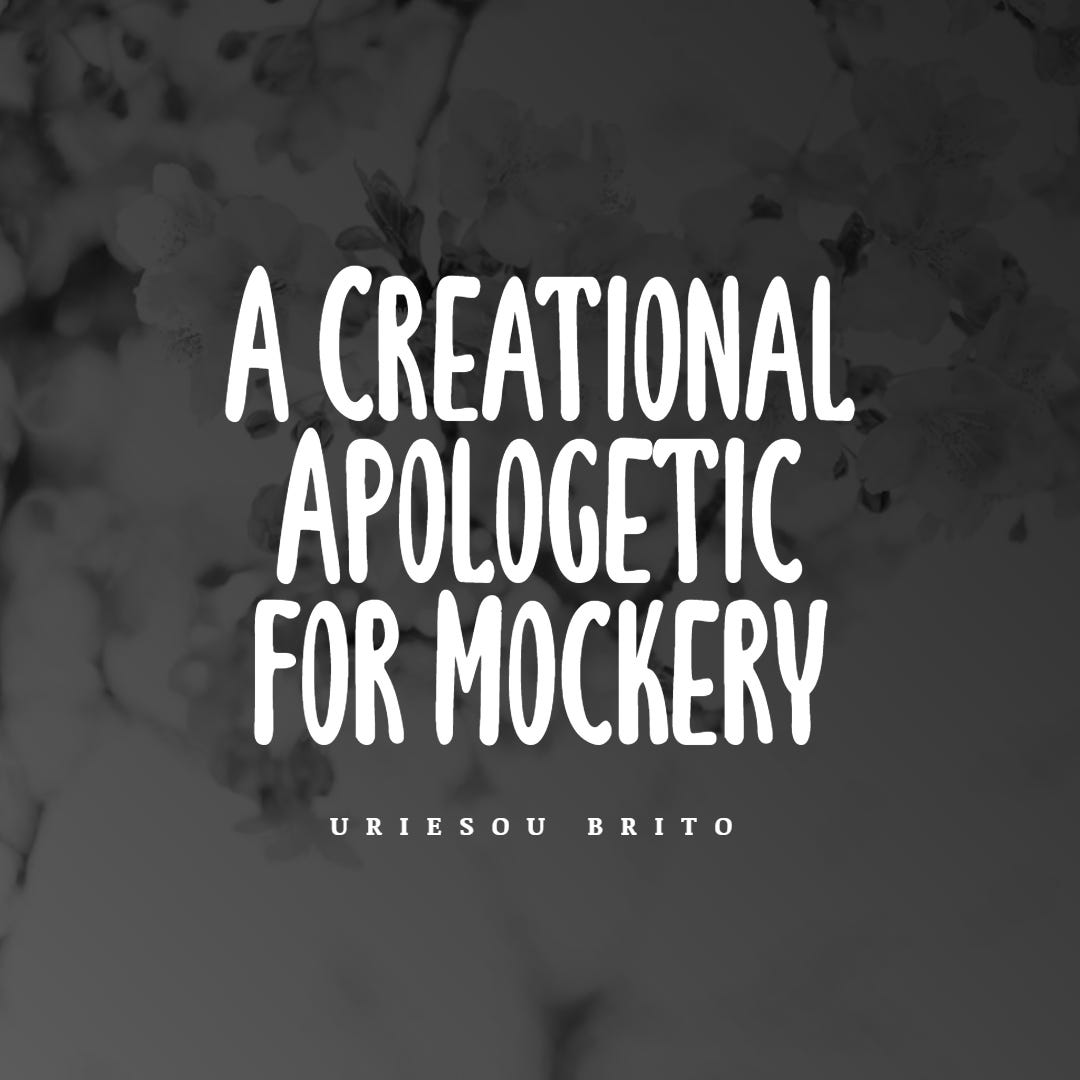A Creational Apologetic for Mockery

Several recent essays have offered a rich description of what has happened to the winsome phenomenon. Evangelical writers and theologians once known for defending the good have sought to minimize Gospel realities by maximizing opportunities for ecumenical endeavors. These endeavors did not produce the fruit expected, and, instead, it has led inevitably to the prodigalness of the evangelical left.
The result is a Babylonian conundrum leaving these figures defending the other side instead of protecting the voices most closely aligned with the cause of the Gospel. The winsome project has led to the adulteration of the good by compromising the good. My premise is that these authors have failed to see the Church’s role as that of protecting the creational order and priorities at all costs. These priorities negate the winsome strategy and advocate for something more distinctly aggressive regarding our relationship with ungodliness in this world.
To provide a bit of a rationale for what I call “A creational apologetic for mockery,” let me begin by offering some propositions and then conclude with some observations about the state of things in the Church.
First, I argue that creational theology compels us to use mockery against evil. Creation, by its very nature, is an apologetic against principalities and powers. Sun, moon, and stars are not merely heavenly descriptors but symbolic ones which proclaim the heavenly reality as the mode of operation for all of history. This reality presents the dignity of man, the labor of man, the complementarity of woman, and the establishment of priestly categories as fundamental antagonists to the attempts of evil men and their institutions to reverse the created order. Thus, the creation account supplants other accounts with an ideal established order and decency for both private and public arenas.
Second, I believe that the Old Testament narratives portray a continuity of the created order. The priestly, kingly, and prophetic world work in harmony to carry Yahweh’s creation to the ends of the earth. It is a work of expansion, and wherever evil abounds, the ancient Church is called to speak against it. She speaks against it with woes and warnings, promising covenant judgment upon the nations should they fail to heed the Creator’s law-word. The language is distinctly hard and unwinsome; it is direct and unsophisticated, according to worldly standards.
Finally, I affirm that Jesus is carrying on the role of creation’s greatest apologist in his earthly ministry and, in particular, in his ministry in Jerusalem. He comes as a new priest/prophet/king of malediction upon those who despise Yahweh’s established order. Indeed, he promises blessings to all who draw close, but to those who despise the kingdom, Jesus chastises, overthrows, and erupts with fury against false teachers. Thus, Jesus’ own ministry is a re-establishing of the Creation. He absorbs a creational apologetic for mockery. He forms a new creation of men, he comforts abandoned brides, he works as a new Adam to make all things right, and he challenges principalities and powers as Yahweh’s sun of righteousness.
These three realities form a theology of mockery. While this is ubiquitous throughout the Scriptures, it is present in glory form in Psalm 2, where the saints are exhorted to join Yahweh in his cosmic laughter against evil schemes. The Psalter encapsulates this hymnal of praise to God and mockery against those who stand against his anointed.
The Church has a fundamental duty to stand as a practicing mockery system because her duty is to protect the Created order from those without and within. Her call is not to winsomeness. As my friend James Wood observes:
“What I describe with this catchall label of “winsomeness” is the package approach of cultural engagement that seeks above all to minimize offense so as to maximize openness to the gospel.”
Instead of pushing further the antithesis, the Church’s voice has sought ways to identify with the antithesis and thus create a false narrative of ecumenism. In attempting to open up avenues for Gospel presentations, she has disfigured the Gospel by presenting a disorderly Word that fails to defend creation’s ethics. We have accepted the premise that battle is a task of fools rather than the task of creation’s ambassadors.
The legacy of Creation pushes the church to speak decisively against the operation manuals of the day, and that means that she must not coddle to the left in any way. It’s all or nothing when it comes to presenting Gospel truth.
This relates directly to modern attempts to build consensus with leftist apologists. David French, Phil Visher, and Jemar Tisby are not interested in a robust faith that seeks to preserve order above all; they are looking for a liberalized society where drag-queen hour can have its festive day just as the priest down the road. But we must push the antithesis by providing a blueprint that seems utterly foreign to the world. We don’t offer sophisticated footnotes to definitive realities. We adhere to a creation apologetic for mockery.
If the Church cannot speak sharply against those realities for fear of offending or under the noble desire to build bridges with unbelief, she will lose her witness and find herself arguing against the very created order that gives us voices. Such churches will grow deeper into skepticism and unbelief until she eventually no longer identifies with the Creator and turns to worship the created thing.
The post A Creational Apologetic for Mockery appeared first on Kuyperian Commentary.

